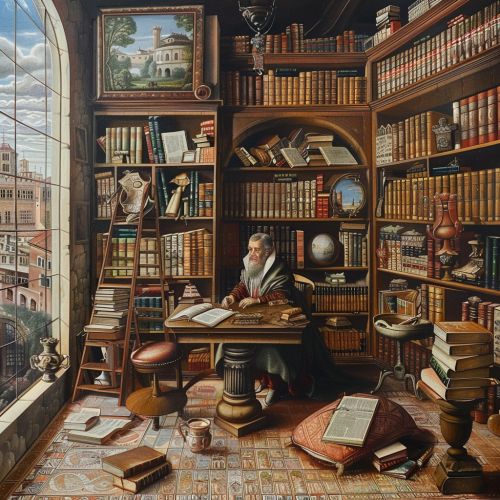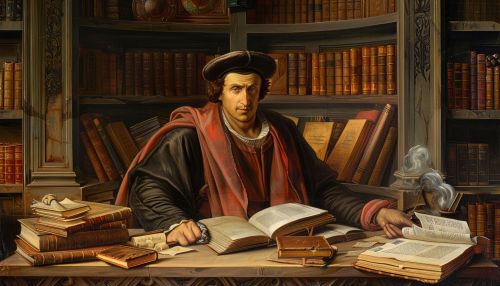Renaissance philosophy
Introduction
Renaissance philosophy, a period of philosophical thought emerging in the 14th century in Italy, is often characterized by its renewed interest in classical Greek and Roman thought, and a shift in focus from religious to secular concerns. This period, which lasted until the 17th century, saw the development of new ideas in various fields such as politics, science, and the arts, which were heavily influenced by the rediscovery of ancient texts and the burgeoning humanist movement.


Historical Context
The Renaissance philosophy emerged during the period of the Renaissance, a time of great cultural change and achievement that began in Italy during the 14th century and lasted until the 17th century. This period marked a transition from the medieval period to the modern age, and was characterized by a renewed interest in the classical knowledge of Greece and Rome. The Renaissance was also a time of great scientific discovery and artistic creativity, with figures like Leonardo da Vinci and Galileo Galilei making significant contributions in their respective fields.
Key Concepts
Humanism
One of the defining characteristics of Renaissance philosophy is the emphasis on humanism, a philosophical and ethical stance that emphasizes the value and agency of human beings. Humanism was a response to the dominant scholastic philosophy of the Middle Ages, which was heavily focused on religious themes. In contrast, humanists sought to shift the focus of philosophy from the divine to the human, emphasizing the potential for individual achievement and stressing the importance of worldly affairs.
Secularism
Another key concept in Renaissance philosophy is secularism, the principle of separation of religion from civic affairs and the state. This was a significant departure from the medieval period, where religious institutions held significant power and influence over all aspects of life. The rise of secularism during the Renaissance was closely linked to the humanist movement, as both sought to shift the focus of society from religious to worldly concerns.
Individualism
Renaissance philosophy also placed a great emphasis on individualism, the moral stance, political philosophy, ideology, or social outlook that emphasizes the moral worth of the individual. This was a marked shift from the communal and religious focus of the medieval period, and was reflected in the art, literature, and politics of the time.
Major Philosophers and Their Contributions
Marsilio Ficino
Marsilio Ficino (1433–1499) was one of the most influential philosophers of the Renaissance. He was a key figure in the Florentine Academy, an informal gathering of artists, poets, and scholars who sought to revive the study of Greek and Roman literature and philosophy. Ficino's translations of Plato's works into Latin played a crucial role in the revival of Platonism in the West.
Pico della Mirandola
Giovanni Pico della Mirandola (1463–1494) was an Italian philosopher and humanist who is famous for his "Oration on the Dignity of Man", often considered the "Manifesto of the Renaissance". In this work, Pico argued for the unlimited potential of the human being to achieve greatness through intellectual pursuit.
Niccolò Machiavelli
Machiavelli (1469–1527) was an Italian Renaissance political philosopher and statesman, secretary of the Florentine republic, whose most famous work, "The Prince", brought him a reputation as an atheist and an immoral cynic.
Influence and Legacy
The influence of Renaissance philosophy can be seen in many aspects of modern Western thought. The emphasis on humanism, secularism, and individualism that characterized this period laid the groundwork for the Enlightenment, a period of intense intellectual and philosophical activity that took place in the 18th century. The ideas and concepts developed during the Renaissance continue to shape our understanding of the world and our place in it.
